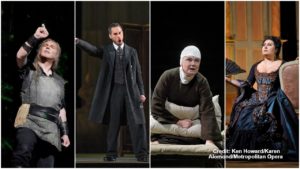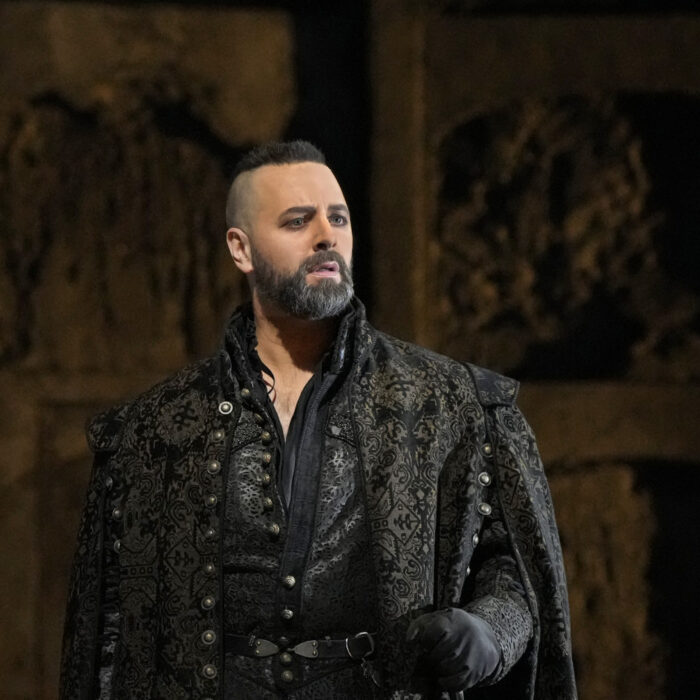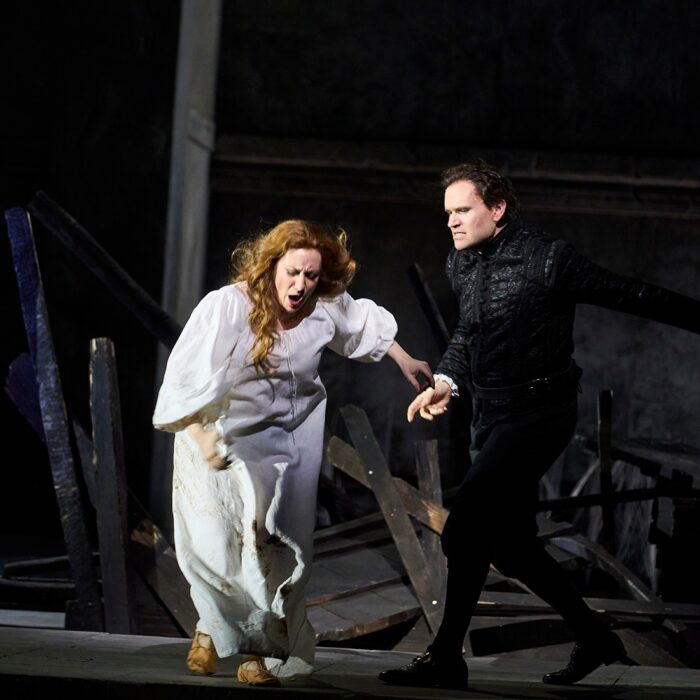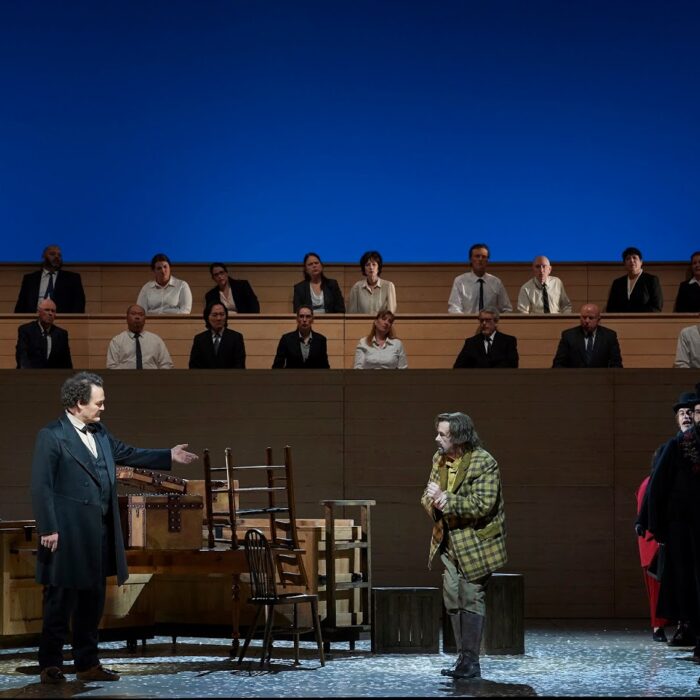
Top 10 Performances By Singers From The Metropolitan Opera’s 2018-19 Season
By OperaWireThis article was written by David & Francisco Salazar
The Met Opera is very consistent at bringing the best stars from around the world to perform on its legendary stage. And year after year, the audience is gifted with potent operatic performances.
This year was no different and today, we enthuse about the 10 singers that remain stuck with us.
Before we go on with our big star showcases, here are some truly honorable mentions:
Greer Grimsley in “Die Walküre,” Eric Owens in “Götterdämmerung,” Sondra Radvanovsky in “Tosca,” Elza van den Heever in “La Clemenza di Tito,” Yusif Eyvazov in “La Fanciulla del West,” Jonas Kaufmann in “La Fanciulla del West,” Anna Netrebko in “Aida,” Jennifer Rowley in “Adriana Lecouvreur,” maestro Henrik Nasasi in “Bluebeard’s Castle,” and Isabel Leonard in “Dialogues des Carmélites.”
Piotr Beczala – Adriana Lecouvreur
Maurizio is no easy character to interpret. He’s got some sweeping romantic tunes, but at the core of this story, he’s a man playing the odds to his advantage. Beczala managed to portray the character in his complexity while delivering some of the most glorious singing of the Italian repertory all season long.
“How he wove those long phrases with such precision and a seemingly endless supply of breath is truly mesmerizing to consider.
Beczala is undeniably in the conversation for best tenor in the world right now; he keeps getting better and better and soon there might be no doubt that he’s right at the top,” noted OperaWire’s review of Beczala’s performance.
Javier Camarena – La Fille du Régiment
He sang 18 high Cs on the opening night. He did the same on the final night (possibly adding another one due to an added syllable in the cadenza) and he never seemed to tire during the course of the historic run of “La Fille du Régiment.”
Camarena just keeps getting better and better and nothing seems to exhaust or stop his glorious tenor from growing and his artistry from flourishing. The encores were testaments to this.
And yet, they were not even the greatest moments of his performance of this opera. That would be left to the second aria, “Pour me rapprocher de Marie,” “where he expanded the legato phrases endlessly… There was a growing desperation with each line that made the emotional crescendo build throughout the aria, climaxing in a heart-wrenching high D natural that the tenor held onto for quite a lengthy amount of time as he knelt.”
Joyce DiDonato – La Clemenza di Tito
Some superstars get by on reputation alone, their artistry undeniable, but not always revealing. DiDonato is anything but that and it just seems that anytime you witness her perform is a transcendent experience.
We could go in so many directions with why her Sesto was incredible, but all we need to do is go to that aria that every mezzo performs at their auditions and which could easily be taken for granted musically as a result.
But in the OperaWire review of DiDonato’s performance, we noted the following: “The opening of the aria was sung in hushed tones, begging Vitellia meekly to forgive him. But with her continued indifference, the voice grew in sound and intensity, the plea becoming more and more desperate; the vibrato grew wider and more present as a result. In the middle of the aria, Mozart left two ‘guardami’ between extended fermata rests. The first of these played off what had come before and DiDonato gave it an imposing forte delivery. But finding her Sesto rebuffed, she moved ever close to Vitellia and with the softest sound imaginable, practically wept the ensuing ‘Guardami.’ It’s one of those moments that reminds you how powerful and emotionally wrenching Mozart’s music could be in the right hands.”
Tomasz Konieczny – Das Rheingold
“Konieczny conjured up one of the greatest Met performances of the season, creating a rich portrayal of a tragic figure who is scorned and rejected by those who feel themselves superior to him,” we wrote about Konieczny after the opening performance of “Das Rheingold.”
He was even better at a subsequent showcase and exhibited similar scene-stealing tendencies in his other appearances in “Siegfried” and “Götterdämmerung.”
There are simply few singers this season with the vocal presence that the Polish bass-baritone exhibited.
Karita Mattila – Dialogues des Carmélites
Speaking of presence, let’s talk about Karita Mattila. If the Opera World had Oscars for best supporting actress in a production, Mattila would be the runaway favorite this season, full stop. While she gets two scenes in “Dialogues” it’s how she managed the second scene, her death sequence, that really mermerized.
We’ll let our review do the honors: “She gave the audience a visceral struggle of someone trying to overcome a fate she knows all too well. The scene sits very low vocally, and while Mattila’s voice seemed to lose focus down there, it suited the moment quite perfectly; you almost felt that her vocal attempts in her lower register matched the Prioress’ increasing loss of energy. As she moved closer and closer to that fateful moment, her singing grew more intense and edgier.”
As was noted in that same review, that’s a performance that you won’t be able to forget anytime soon (nor would you want to, honestly).
Kyle Ketelson – Pelléas et Mélisande
The baritone was the truly dominant force of this revival of Debussy’s opera. Every minute that he was onstage was pure artistic gold, every moment full of details and nuance that elevated the performance.
“His vocal performance was its nuanced and psychologically frayed. In some fleeting instances you could feel that he was pleading with Mélisande, but those were quickly displaced by pure fury and vengeance. He moved about the stage like a hunter ready to take down his prey and when he did, it was vicious and nasty. There was tension with every look, every movement, and every sound that came out of his voice…His performance was so intense that you actually feared for Mélisande; theater truly became real life,” noted the review.
Matthew Polenzani – La Clemenza di Tito
The tenor is arguably the finest exponent of Mozart and his interpretation of Tito was an unmeasurable success from start to finish. Portraying the emperor as endlessly conflicted, Polenzani is one of the few singers that can take a passage of recitative and turn it into a display of tormented inner conflict. But that’s exactly what he did in this very opera, using the extremes of his vocal potency to express Tito’s two differing perspectives.
“Then came the incredible scene with Sesto, full of tension and conflict. After using the full resources of his voice and even blasting out his sound on ‘Non odi?’ his sudden shift to pianissimo singing on the recitativo “Odimi, oh Sesto; siam soli,” felt like the taking off of a mask, furthering the sense of Tito navigating two spheres carefully. He delivered the entirety of this passage with hushed tones, giving him increased vulnerability and adding to the suspense of the moment,” noted the OperaWire review.
Anita Rachvelishvili – Adriana Lecouvreur (Also “Aida” & “Samson et Dalila”)
Anita Rachvelishvili had arguably one of the finest seasons of her Met career. She took on three important roles throughout the season, each getting better and showcasing a different facet. This was especially telling in her portrayal of the villainous Princesse de Boullion. Rachvelishvili used her entire arsenal to give a fully fleshed characterization.
As we noted in our review, “When Anita Rachvelishvili entered the stage, all eyes were on her. Her opening ‘Acerba Volutta’ was full of power with the booming mezzo projecting full blast. There was anger, power and despair for the tortured Princess. Yet in many ways, Rachvelishvili explored a more intimate realm of the character in the middle of the aria with a mezzo forte sound. It was a brief respite however, as she concluded the aria with an overwhelming fortissimo sound on the final ‘Amor.'”
Stefan Vinke – Siegfried
Perhaps the most heroic debut of the year came from Vinke and one might argue it was one of the greatest debuts in years. Taking on the demanding role of Siegfried, Vinke used his full power throughout a six-hour evening, never showing a bit of fatigue. He gave the character depth and nuance and really demonstrated his command of a role he has performed throughout the world. He was not only vocally in shape, but he was a commanding presence physically.
“The moment Vinke stepped on stage he was Siegfried. He was a swaggering youth looking for adventure and discovery and he was playful throughout,” Operawire noted during the premiere of the run.
Eva Maria Westbroek – La Fanciulla del West
The Dutch soprano is well-known for her portrayal of Minnie and it was very evident during this run. The minute she stepped on stage she brought charisma to the role and a a youthful quality to her portrayal. This season, her turn as Minnie gave viewers a chance to see Westbroek as an innocent, loving, heroic and imposing figure. She also gave audiences tremendous singing that was filled with passion.
OperaWire noted of Westbroek’s performance, “She commanded the stage at every juncture from the moment she arrived, admonishing the boys for their bad behavior. You sense Minnie sense of power and Westbroek’s booming voice only reinforced this notion.”
Categories
Special Features

